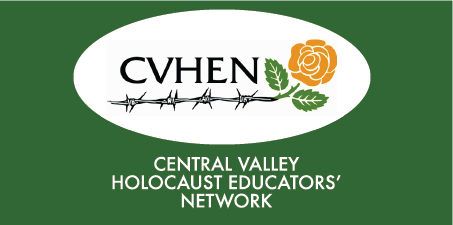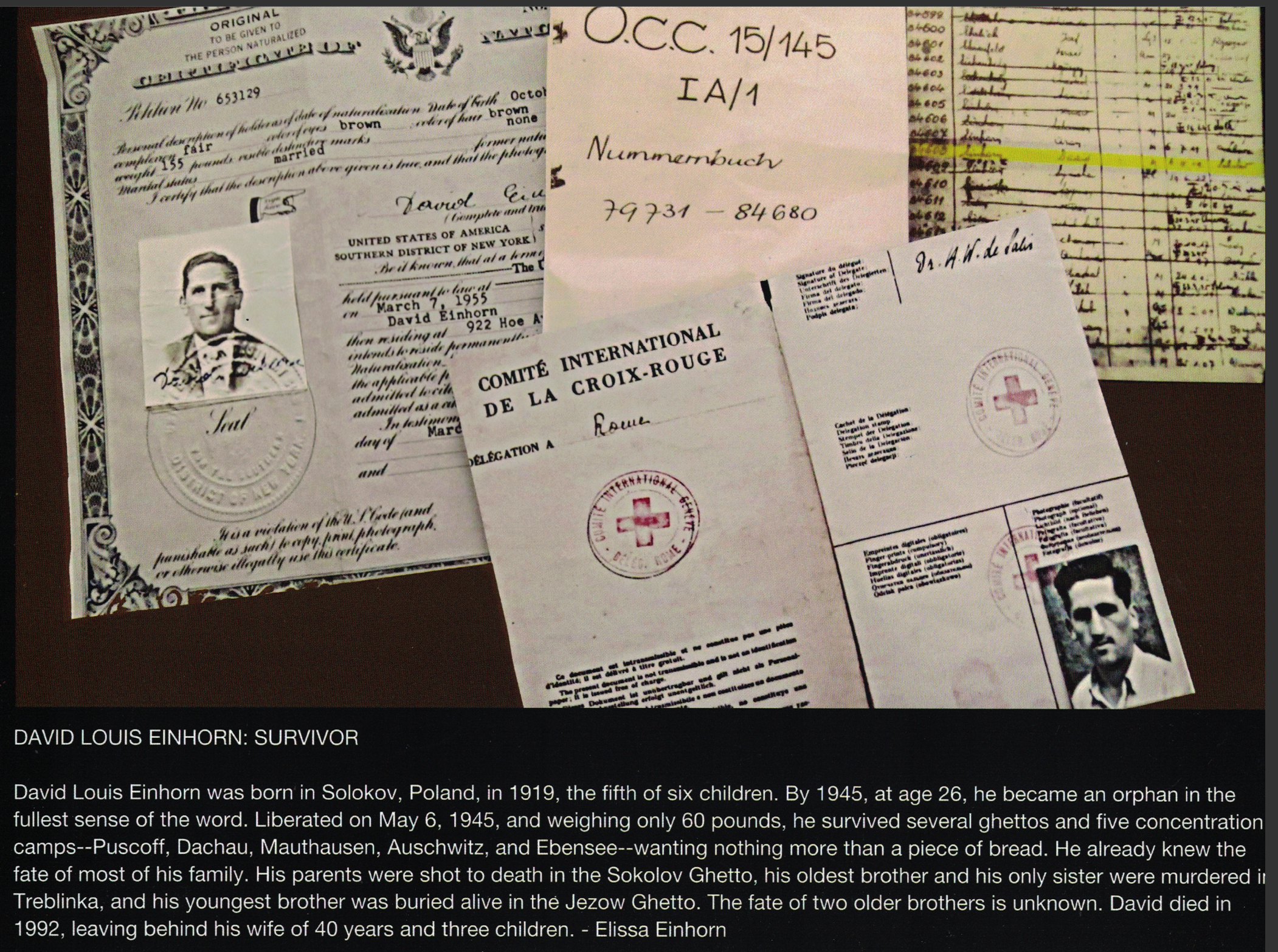Speakers Bureau
Holocaust survivors, children of survivors and liberators of Holocaust victims are available to visit classrooms, school assemblies and community organizations to speak about their experiences.
Liz lgra, President and founder of CVHEN, retired educator and a Holocaust survivor, has spoken about her life to many groups over the years. In her current position, Liz continues to tell her story to people of all ages and interests, from elementary school and college students, from rabbis and congregations, to professional groups and civic organizations.
liz's past PRESENTATIONS
2nd Generation Group
As the number of Holocaust survivors dwindles, it is increasingly important that adult children of Holocaust survivors give voice to their parents' personal experiences. In 2012, the CVHEN 2nd Generation Speakers Bureau was established. CVHEN can now provide 2nd Generation speakers who can help put their parents' stories into historical context for a variety of audiences. They also offer an additional narrative of how the legacy of the Holocaust affects subsequent generations.
Are you a child of a Holocaust survivor? Consider joining our 2nd Generation Group. There’s no membership fee and attendance is free. The group meets monthly in members’ homes and is facilitated by Diane Weber and Kathy Glatter. Members choose monthly topics of mutual interest, invite speakers, or present a personal story.
If you are interested in attending these meetings, contact Diane Weber at Oobliett@hotmail.com or Kathy Glatter at kaglatter@gmail.com
need a speaker?
To arrange for a speaker, contact us by filling in the form below.
Speaker Bios
David Komar:
David Komar is the grandson of Erich and Elsbeth Frey, Holocaust victims. My grandfather was born in Berlin in 1889 and fought in World War I. Erich married Elsbeth in 1916, and they had two daughters, Liselott and Marie-Anne. In 1935 Erich was forced into retirement because he was Jewish. His daughters managed to emigrate to England and Palestine in 1939. Unfortunately, Erich could not get an immigration permit because he was almost completely blind, but in 1942 he started training as a brush maker for Otto Weidt’s Brush Workshop for the Blind in Berlin. Otto Weidt, like Oskar Schindler, risked his life to save Jews. Later in 1943, Erich and Elsbeth went into hiding in the basement of the workshop, and in 1944 were hidden by non-Jewish friends, until they were caught and sent first to Theresienstadt, and later deported to Auschwitz, where they were murdered. After the war, my mother, Liselott received from the Red Cross a 14-page letter* written by my grandfather to both daughters in 1942. It documented their daily life as Berlin Jews and their hardships associated with the Nuremburg Laws. They also stated how grateful they were that their daughters were safe and that this letter would prepare them for what might happen to their parents.
Diane Weber:
My parents were both born in Hamburg, pre-WWII, into working class families. They lived in the same neighborhood, and my father’s sister was my mother’s best friend. They grew up in a time when laws regarding Jews were changing, and they had to leave the country after my father and his family were arrested for interfaith marrying in 1938. My mother found passage to Shanghai, China, one of the few countries accepting Jews at the time. They, along with my brother left their whole family thinking they would return in a few short months. They never saw their families again.
Maria Winkler:
Maria Winkler is the daughter of Dr. Joseph Winkler, a Holocaust Survivor, whose story of survival was recently published by Yad Vashem in a book called "Europe in the Eyes of Survivors of the Holocaust". Joseph was a scientist at the Galicia Oil Refinery in Drohobycz, Poland, when the Germans invaded Poland in 1939. By removing and hiding crucial parts of the distillery before leaving the refinery, he prevented the Germans from operating the oil refinery. Joseph was captured by the Germans, who demanded to know the location of the missing parts. After he refused to reveal the hiding place, he was locked in his office, to be shot the next morning. In the middle of the night, he managed to escape. Considered a hero by the Russians who entered the city of Drohobycz two days later, he was put in charge of the refinery by Nikita Khrushchev, the Secretary General of the Communist Party of Ukraine. However, two years later the Germans re-entered the city, and Joseph was targeted again, forcing him to flee Poland for Siberia. There, he barely survived by virtue of his education and creativity, although at a tragic personal loss.
Caren Rubin
Caren Rubin is the daughter of Mark and Pam Rubin of Beverly Hills, California. Caren is a member of the CVHEN 2nd Gen Speakers Bureau and has presented her family story to many different schools in Northern California. She tells the story of her father, Mark, who was one of 100 children who were liberated after eight months from Terezin in March 1945. She is also an active member of the Sacramento Jewish community and enmeshed in many projects at Mosaic Law Congregation.
In 2023, Caren presented at the National WWII Museum’s Holocaust Remembrance event, where she is the only child of a Holocaust survivor to be on the museums Board of Trustees. She inherited the position from her father, who was the only Holocaust survivor on the board.
C.B.
My dad was born in 1922 in Paderborn, Germany, in the state of Westphalia in Northern/Central Germany. His prominent family was entrenched in this region on both maternal and paternal sides for generations. Our vast family network from Italy to France and some within Germany, aided my Grandfather and his family with advice, money and contacts, during the rise of the Nazi regime. When the Gestapo ordered my father to report for a work camp assignment Dec 1938, a plan was formulated to smuggle him out of Germany as a chaperone on the Kindertransport. Once safely in England, he worked as a butler in London. Within months, a cousin in Paris, bribed officials at the Bolivian Consulate there, providing my grandparents, aunt and dad the documents they needed to book passage on a ship in May 1939 to South America. My father stayed in Bolivia for 12 years, with much adventure including marrying my mother, Angelica Gomez de Paiva, a native Bolivian, and a catholic. By the luck of a lottery, and my uncle's established roots in San Francisco, my parents arrived in the US JULY 1951 and my dad became a US citizen in 1956. My mother retained her Green Card, legal immigrant status, her entire life.
"Why was Bolivia accepting Jews, and how did our French relatives supporting the resistance efforts know to select this country for assistance for my family has been an unanswered question. In March of 2017, old files discovered in Bolivia have revealed the story of a controversial businessman hailed as the "Bolivian Schindler" for helping as many as 9,000 Jews flee to the South American country to escape the Nazis. Who was this man and the connection to my father was uncovered September 2017.
Elissa Einhorn
Elissa Einhorn is a freelance journalist who has published thousands of articles about people places, and issues in print and online publications such as The Jerusalem Post, Times of Israel, and the J (Jewish News of Northern California). She is the youngest child and only daughter of David Einhorn (z”l). David Einhorn was born in Sokolov, Poland on October 6, 1922 (we think). He was one of six children of Avraham Moshe and Etel Ester. David survived several concentration camps and ghettos, including Mathausen, Plaszow, and Dachau. He was liberated from Ebenzee on May 6, 1945, weighing 70 pounds. He called it his second birthday. David was the only survivor of his nuclear and extended family. Some family were shot in ghettos; others murdered in gas chambers. He survived on sheer stubbornness (I am being quite literal here). David arrived at Ellis Island in 1950. His name appears on the Wall of Immigrants. Life was always difficult for him. Plagued by survivor guilt, he enjoyed nothing and was haunted by nightmares. It was not uncommon for him to be found running in his sleep, screaming, or worse, whimpering. He was a whiz with numbers and hard worker who always provided for his family. He loved his wife and his three children deeply, but never recovered from his loss.
Tamara Theodora
My name is Tamara Theodore. I have recently retired but worked for many years as a Pediatric Occupational Therapist and also worked over 20 years as a psychotherapist. My parents were both Holocaust survivors. They were in Krakow Poland before the war and knew each other. My mom was 16 when the war broke out, my dad 21. They had a normal life going to school, after school activities etc. My father joined the Czech underground from the Krakow Ghetto, my mother was transported to 5 different camps and was on two death marches. How they survived, especially my mom was a miracle. After the war, they had lost almost all their families but found each other. They married and moved to Prague Czechoslovakia. From there, it took three years to get visas to America but they came in 1948 and slowly made their way across the country to settle in the Los Angeles Area in California. My mom adapted very well becoming a successful business woman running a catering house. My dad never acclimated to American life and was generally a lost soul. I know my mom’s story but unfortunately my dad never wanted to talk about the war and his story is lost forever.
Estelle Tansey
Estelle is a former prosecuting attorney, having retired from the Placer County District Attorney’s Office in 2010, after 24+ years as a Deputy District Attorney. Her parents, Michael and Lola Blatt, were both holocaust survivors, who emigrated to the United States after the war. Both parents are now deceased.
Michael Blatt was born in Romania in 1913, and was a prisoner in the Mauthausen Concentration Camp from June of 1944. Many members of his family were killed by the Nazi’s during the holocaust. A brother survived and emigrated to Israel. Michael was a physician, who was licensed and practiced medicine in New York State until he retired.
Lola Potok Blatt was born in Benzin, Poland in 1921. In 1939, at 18, she was married and gave birth to a baby girl, Itka, in the Ghetto there. Sometime during the next 18 months, Lola, her daughter and many members of her family were transported to Auchwitz Concentration Camp, where the baby Itka, & many other members of Lola’s family were killed. Lola survived, and married Michael Blatt after the war. Lola became the president of a multinational corporation that manufactured and sold aircraft engine parts and aircraft-related chemical sealants.












